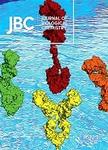版权所有:内蒙古大学图书馆 技术提供:维普资讯• 智图
内蒙古自治区呼和浩特市赛罕区大学西街235号 邮编: 010021

作者机构:Univ Jena Ctr Vasc Biol & Med D-99089 Erfurt Germany
出 版 物:《JOURNAL OF BIOLOGICAL CHEMISTRY》 (生物化学杂志)
年 卷 期:1999年第274卷第12期
页 面:8254-8260页
核心收录:
学科分类:0710[理学-生物学] 071010[理学-生物化学与分子生物学] 081704[工学-应用化学] 07[理学] 08[工学] 0817[工学-化学工程与技术]
主 题:抗氧化剂/药理学 抗坏血酸/药理学 生物蝶呤/类似物和衍生物 生物蝶呤/药理学 钙/代谢 细胞 培养的 瓜氨酸/代谢 环GMP/代谢 药物协同作用 内皮 血管/药物作用 内皮 血管/代谢 酶诱导/药物作用 自由基 一氧化氮/生物合成 一氧化氮合酶/生物合成 一氧化氮合酶Ⅲ型 人类
摘 要:Ascorbic acid has been shown to enhance impaired endothelium-dependent vasodilation in patients with atherosclerosis by a mechanism that is thought to involve protection of nitric oxide (NO) from inactivation by free oxygen radicals. The present study in human endothelial cells from umbilical veins and coronary arteries investigates whether L-ascorbic acid additionally affects cellular NO synthesis. Endothelial cells were incubated for 24 h with 0.1-100 mu M ascorbic acid and were subsequently stimulated for 15 min with ionomycin (2 mu M) Or thrombin (1 unit/ml) in the absence of extracellular ascorbate. Ascorbate pretreatment led to a 3-fold increase of the cellular production of NO measured as the formation of its co-product citrulline and as the accumulation of its effector molecule cGMP. The effect was saturated at 100 mu M and followed a similar kinetics as seen for the uptake of ascorbate into the cells. The investigation of the precursor molecule L-gulonolactone and of different ascorbic acid derivatives suggests that the enediol structure of ascorbate is essential for its effect on NO synthesis. Ascorbic acid did not induce the expression of the NO synthase (NOS) protein nor enhance the uptake of the NOS substrate L-arginine into endothelial cells. The ascorbic acid effect was minimal when the citrulline formation was measured in cell lysates from ascorbate-pretreated cells in the presence of known cofactors for NOS activity. However, when the cofactor tetrahydrobiopterin was omitted from the assay, a similar potentiating effect of ascorbate pretreatment as seen in intact cells was demonstrated, suggesting that ascorbic acid may either enhance the availability of tetrahydrobiopterin or increase its affinity for the endothelial NOS. Our data suggest that intracellular ascorbic acid enhances NO synthesis in endothelial cells and that this may explain, in part, the beneficial vascular effects of ascorbic acid.